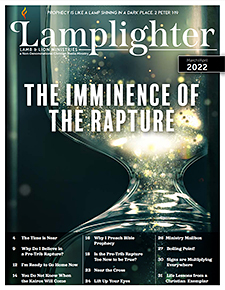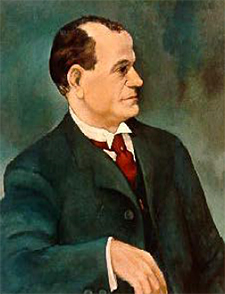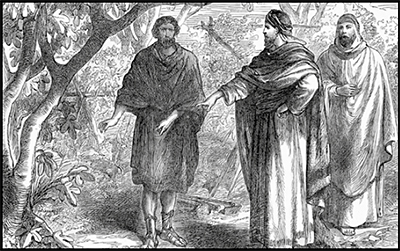The Time is Near
The Urgency of Our Core Message
By Tim Moore

Storms and natural cataclysms are multiplying. Rumors of war are increasing—in Europe, in the Middle East and the Far East. Christianity is declining in the West and expanding in formerly hostile nations. Israel is increasingly threatened and isolated.
For anyone with eyes to see and ears to hear, the signs of the times are crying out that the end is near. The cacophony is growing day by day.
It would be easy to become preoccupied with the signs themselves. Some watch the political trends and want to respond politically. Others perceive the inherent threats in emerging technologies and want to unplug from the world. While the Lord motivates different individuals to serve in different capacities (applying their gifts to be salt and light in different spheres), suffice it to say that a balanced approach is probably wise. Even as we discern meaning from the signs, the question remains: Am I consuming the news or is the news consuming me?
The Urgency of Our Core Message
The primary mission of Lamb & Lion Ministries is to proclaim the soon return of Jesus Christ. That has been our guiding purpose for 42 years. If anything, the timely importance of our core message has only grown more urgent.
We believe that Jesus is at the gates of heaven, waiting for His Father to say, “Go, and get Your Bride.” When that happens, a trumpet will sound and He will burst forth to gather His elect from the four corners of the earth. In the twinkling of an eye, we will be caught up to meet Him in the air. Our mortal bodies will instantly be changed into glorified, imperishable bodies just like Jesus had after His resurrection. And we will return to heaven with our Bridegroom to enjoy the marriage feast of the Lamb.
It’s one thing to intellectually accept the truth of those promises. But it’s another thing to have the anticipation of their fulfillment overflow our heart and mind and spirit.
A Lineage of Faithful Expectation
The signs themselves are important, but only as they advise us of what lies ahead. So, we don’t want to fixate on the signs themselves instead of focusing on the event—or the Person—they point to. Alternatively, we can get so caught up in the rut of daily living that we don’t even recognize the multiplying signs.
I think there is value in looking back in time to understand how previous generations of Christians perceived the signs pointing to Jesus’ return. We know that almost 2,000 years ago, the writers of the New Testament shared the expectation that Jesus could come back very soon. Their anticipation did not distract them from the commission to preach the Gospel, or to spread it to tribes and nations far from Israel. As a matter of fact, their urgent hope actually served to motivate their dedicated service. That is why Paul traveled throughout Asia Minor and desired to go to Rome. It is why doubting Thomas went east to India to proclaim the Good News there.
Followers of Christ who obtained and read the Scriptures for themselves throughout the Dark Ages (when private Bible ownership was banned and translation was deemed a capital offense) realized that the promise of Jesus’ return is intrinsically linked to the Gospel message. Anyone who believes the Bible’s consistent testimony—”reading and heeding” in the words of Revelation —understands that He is coming soon.
Over the past few years, I’ve begun collecting books and tracts from the turn of the last century. Just over 100 years ago, faithful Christians were excited about what they understood would come to pass relatively soon in human history. Prior to World War I and II, Christian authors sensed that prophetic signs were multiplying.
At the turn of the past century, many Christian writers testified to a growing anticipation of God’s age-old promises being fulfilled. Several expressed a belief that God would somehow motivate the Jewish people to return to their ancient homeland. Although the Jews were dispersed around the world and integrated in places like France, Germany, Poland, and Russia, they foresaw a time when the Jewish Diaspora would clamor to go home—because that is what Ezekiel foretold. Their faith was not dampened by the implausibility of resurrecting a Jewish state in the middle of a hostile Muslim world—or the possession of the Holy Land by a Turkish-based caliphate. They simply accepted the Word of the Lord and looked for the ultimate fulfillment of all its promises.
In his booklet, The Coming Dictator and Is Jesus Coming Back? (published in 1934), William Edward Biederwolf described the coming antichrist and his anticipation of Jesus’ soon return. He cited Henry Alford, renowned Greek scholar at Cambridge University and Dean of Canterbury, who wrote, “The majority both in number and in learning and research adopt the pre-millennial advent, following, as it seems to me, the plain and undeniable sense of the sacred text of the Bible itself.”

R.I. Humberd was another prolific writer who discerned that he was living on the cusp of prophetic events long anticipated by faithful Christians. His 1934 booklet, God’s Man and Satan’s Man in Final Conflict, contains this word of testimony: “If we are living in the latter times (and I am convinced that we are) then soon we can expect the Jews to return to [the Promised Land] and ‘dwell safely all of them.'”

Humberd went on to offer another insight: “Kings may argue, write letters and send notes, but the last thing they do, before the battle, is to recall their ambassadors. For many centuries, God has had His ambassadors on Earth, calling men to ‘Be ye reconciled to God’ (2 Corinthians 5:20). But just before the strife come out into the open, God will call His ambassadors home.”
What a wonderful illustration! We are certainly called to serve as ambassadors—what are still called ministers in diplomatic parlance—here in the world. But our soon-returning King will come to bring us home before His wrath is poured out on the earth. Until then, we should be about His business day by day.
The past few years demonstrate that the threat of a coming dictator Bidderwolf foresaw in 1934 is looming again. Without chasing down the rabbit trail of Covid protocols and heavy-handed government control, the undeniable reality is that many would trade their liberties for the perceived security offered by a central authority. Be that political or scientific or medical, we’ve learned that benevolence in such exalted authorities is rare, and short-lived even when it can be found.
There is nothing new under the sun.
What Has Changed?
Discerning Christians recognized a hundred years ago that the world was on the cusp of calamitous events with prophetic significance; Hal Lindsey, Tim LaHaye, David Reagan, and others emphasized the signs of the times pointing to the coming of the Lord beginning in the 1970s and 80s. Christians for 2,000 years have anticipated the Rapture of the Church—someday. What has changed?
What has changed is the culmination of signs.
Today all the various signs are increasing in frequency and intensity. That is measurably true in the realm of natural signs. Storms and other natural disasters are happening more often—and with greater impact to human life. Societies are disintegrating before our eyes—with the formerly Christian West rushing toward Post-Christian secular humanism. Spiritual signs—both positive and negative—are multiplying. The nations of the world are tracking toward the anti-Israel alignment foretold in Bible prophecy. Technology has advanced to the point that the dire and fantastic dystopian warnings offered in Revelation are feasible today.
And, overriding all of that, the presence of Israel on the world stage—and the growing isolation and animosity it is experiencing from the community of nations—fulfills Jesus’ prophecy of the cursed fig tree.

He Is Near, Right at The Door
Some consider Jesus driving the moneychangers from the Temple to be the most dramatic incident for our meek and humble Lord. But the incident that seems far more uncharacteristic is Jesus’ cursing of a fig tree that was not bearing fruit (Matthew 21:18-19a and Mark 11:12-14). Mark makes a point of recording that it was not the season for figs. Surely Jesus knew that. Why expect a tree to bear fruit out of season? And why curse it for simply existing according to its own nature? Even the disciples seemed surprised to see the tree wither so dramatically (Matthew 21:19b-22 and Mark 11:20-22).
Jesus was clearly making a point to His disciples. In that moment He emphasized the sovereignty of God and the power of prayer. Later, however, He offered them—and us—insight regarding the end times. During an extended description of His promised second coming, Jesus said, “Now learn the parable from the fig tree; when its branch has already become tender and puts forth its leaves, you know that summer is near; so, you too, when you see all these things, recognize that He is near, right at the door” (Matthew 24:32-33).

Israel is that fig tree, as demonstrated repeatedly in Bible prophecy (Hosea 9:10, Jeremiah 8:13, Jeremiah 24, and Micah 4:4). It was cursed, cast aside, and exiled for an extended period because it did not bear much fruit—even though the time for it to bear much fruit had not yet come. But in just the past 75 years, Israel has become tender and put forth new leaves. Summer is coming and a bountiful harvest of fruit is promised.
The point for us is that this overriding sign—the reestablishment of Israel, its re-possession of its ancient capital of Jerusalem, the growing animosity of the world that will lead to outright hostility against Israel (driving it to the end of itself and into the arms of God)—tells us that He is near, right at the door.
The Light Shines in The Darkness
In the beginning, God’s first creative utterance was, “Let there be light” (Genesis 1:3). His light pierced the darkness and was good.
John opened his Gospel account by pointing back to the beginning. He wrote, “In the beginning was the Word, and the Word was with God, and the Word was God. He was in the beginning with God” (John 1:1-2). We know that Jesus is the Word, the manifest Person of God. John tells us that “in Him was life, and the life was the Light of men. The Light shines in the darkness, and the darkness did not comprehend it” (John 1:4-5).
The world 2,000 years ago was a dark place. The Canon of Scripture as we know it had closed out with Malachi, the prophet who ended his book with the ominous words, “and smite the land with a curse” (Malachi 4:6). That phrase ended a prophetic passage of hope. God promised to send “Elijah the prophet before the coming of the great and terrible day of the Lord” (Malachi 4:5), but the Jewish people living under Roman oppression surely felt like their land had been smitten with a curse.
In the midst of that dark hour, Simeon and Anna were living expectantly. They were looking for the Lord’s Messiah—and realized a great blessing when they were able to meet and hold Jesus as a baby. The Holy Spirit had revealed to Simeon that he would “not see death before he had seen the Lord’s Christ” (Luke 2:26).

Similarly, while Jesus lay in the grave, the disciples were not full of hope. They were dejected and dismayed. Their world had been shattered and they were not sure how to proceed. But when Jesus rose again, their eyes were open and they understood His victory over darkness and death. Once they were filled with the Holy Spirit, they were inspired to lives of dedicated service—full of expectation, even then, that Jesus would come again. Our upcoming celebration of Resurrection Day reminds us of that victory and points to the promise of our own resurrection at the Rapture of the Church.
We live in another era when darkness has descended upon the earth. Oppression is rising and hope is waning. But Christians are not subject to darkness or consigned to hopelessness. We already know the Blessed Hope; we already have the Light of life (John 8:12). Paul is so bold as to say, “You, brethren, are not in darkness, that the day [of the Lord] would overtake you like a thief; for you are all sons of light and sons of day” (1 Thessalonians 5:4-5a). His clear message is that we should discern the signs of the times pointing to Jesus’ soon return.

Why The Signs of The Times?
Sometimes we talk about “what” of the signs of the times without considering the “why”. In other words, why did God tell us there would be signs to look for pointing to Jesus’ second coming? I think there are three reasons:
1. He does not allow us to know the day or the hour, but He wants us to recognize the season of His return.
Jesus roundly chastised the people of His day for failing to recognize the signs of the times (Matthew 16:2-3); He offered numerous signs that point us toward the season of His return.
2. While we labor diligently for the Master while He is away (Matthew 25:14-23), realizing that He is returning soon should motivate us to redouble our efforts—sharing the gospel and urging lost people to flee from the wrath to come.
Paul urged the Church in Rome—and by extension every follower of Jesus Christ—to “do this, knowing the time, that it is already the hour for you to awaken from sleep; for now salvation is nearer to us than when we believed. The night is almost gone, and the day is near” (Romans 13:11-14).
3. He does not want the lost to slip into eternal oblivion without a heightened awareness of the cataclysm that awaits them.
God sends warnings before His wrath is poured out—as He did in Noah’s day, to Sodom and Gomorrah, and to Nineveh; in the end times a Gospel angel will fly above the earth crying out, “Fear God, and give Him glory, because the hour of His judgment has come” (Revelation 14:7).

Heavenly Minded and Earthly Good
Right now, even those without the indwelling presence of the Holy Spirit can discern that something is terribly amiss in the world. Their hearts are like plowed ground, ready to receive seed. Our own discernment of the Signs of the Times should not inspire anxiety and frustration and fear, but rather motivate us to plant and water and fertilize and rune—making disciples of all the nations.
We should praise the Lord that He calls us each to serve in a way, a place, and a time where our gifts and talents can bring Him glory.
But in a broader sense our recognition of the Signs of the Times should motivate us all to realize that time is growing short. If the King really is coming—soon, and very soon—then our lives should be oriented around that glorious truth.




